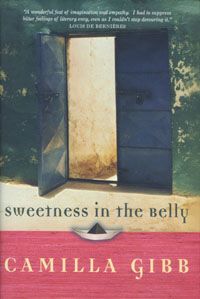This review contains affiliate links, which earn me a small commission when you click and purchase, at no extra cost to you. Thank you for supporting my small business and allowing me to continue providing you a reliable resource for clean book ratings.
Historical fiction is a tricky genre: it has to be just right. If the history and historical setting overwhelm the plot and the characters, it tends to be boring. However, if there is little or no historical setting, or if the author plays fast and loose with historical characters, the novel tends to sound too modern, which negates the historical impact. So when a book gets it just right, feels so effortless, so seamless, that one absorbs the historical part along with the fiction, it’s pure joy to read.
Sweetness in the Belly is one such book. Told in alternating sections — from Ethiopia in the 1970s to Britain in the mid- to late 1980s and early 1990s — it tells the story of Lilly, the orphaned daughter of British parents, and her experiences growing up in Morocco and Harar, Ethiopia, as well as her embracing Islam. It’s not an easy story to read: Lilly does not have an easy life — from the murder of her parents when she was eight to her desire to make a place for herself in Harar, to her eventual flight back to England when the 1974 Ethiopian revolution broke out — she has to struggle and fight and push to make her life work.
That struggle is what makes the dichotomy between the two sections, the two lives of Lilly, work so well. The Ethiopian sections leap off the page with a visceral reality. The textures, sights, smells, and workings of Lilly’s life there are painted in broad strokes and brilliant colors. The lives of the women that Lilly ends up living with are difficult, and yet there is joy. Lilly discovers not only the depth of caring she has for the people — especially the children — around her, but her talent for teaching the Qur’an. She meets a handsome doctor, someone else who doesn’t quite fit in the strict Harar society, and falls in love. She finds — makes — a home for herself.
And so, when the world comes crashing down around her in 1974, when suddenly being a farenji — a foreigner — is no longer just looked down on, but dangerous, she flees to England. The writing in these sections reflects Lilly’s life: spare, depressing, much like a London winter: gray, rainy. There are bright spots: she finds (accidentally) and makes a friend in a fellow Ethiopian, Amina, who is missing her husband. They build a life together, seeing themselves as co-wives, even though they aren’t. And while Amina holds out hope for reuniting with her husband, Lilly falls further into a despair, losing hope that she’ll never see her doctor “friend” again.
Gibb effortlessly weaves the history of a place as well as the feel of a religion into the plot. The book is less about race and religion and more about culture and shared experiences and how both of those can overcome the barriers. There is a subtle mourning for the loss of place and the loss of common ties, and yet there is hope that people can find new ties and new bonds even when displaced from their homes.
A most excellent book.
Rated: Moderate (there’s one tastefully done sex scene, quite a few instances of mild swearing, and a fairly graphic description of female circumcision)
Click here to purchase your copy of Sweetness in the Belly on Amazon.




